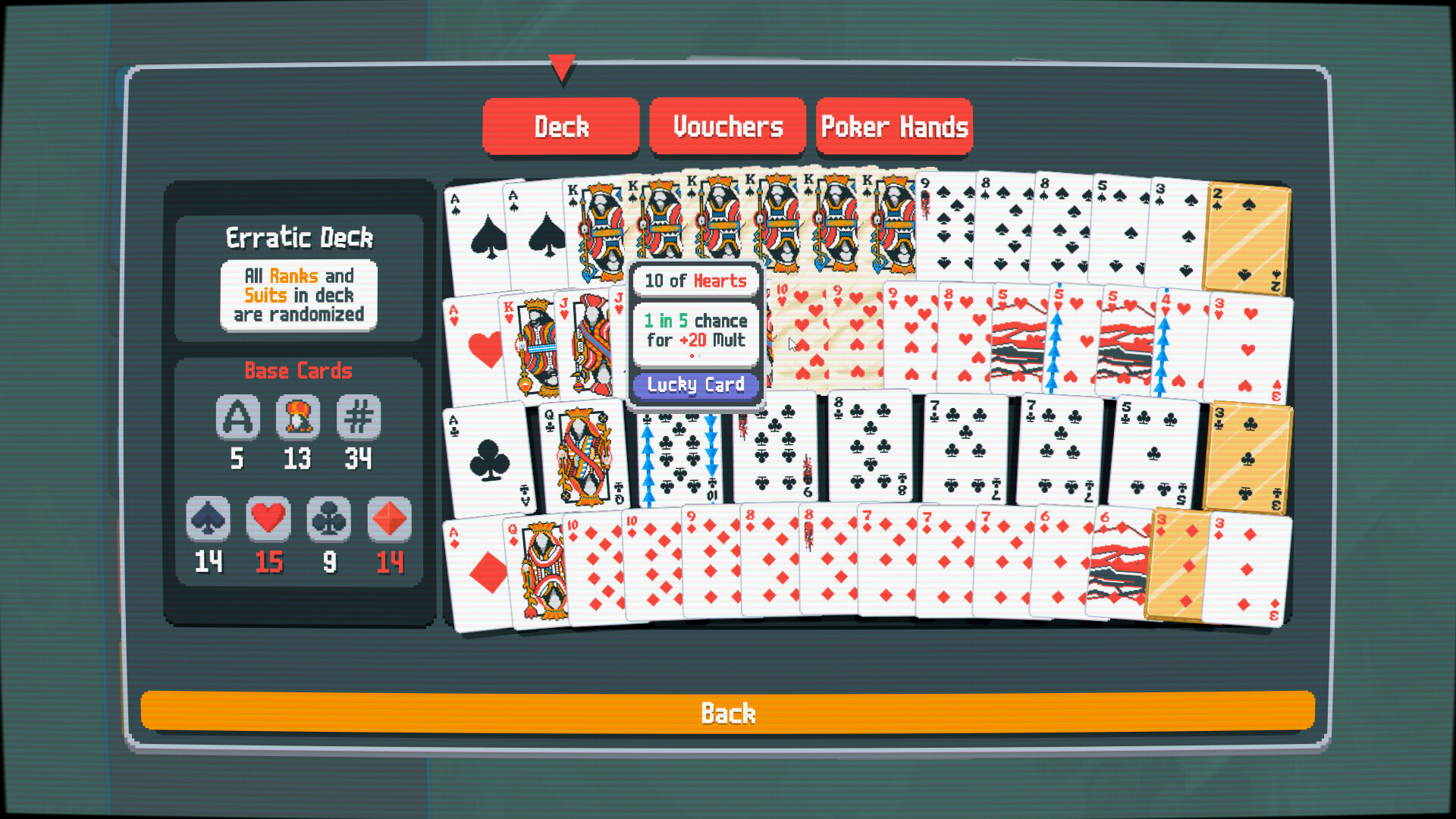
Balatro is a game that feels made for me. It’s a roguelite card game that, due to it being a fresh take on poker, is all about risk and reward.
Launching just last month, it already sits at the coveted “Overwhelmingly Positive” rating on Steam, with over 18,000+ positive reviews. For the unfamiliar, it’s a card game, where you have to play hands of poker to win chips. Jokers are added to the top of your board which give you extra chips per hand, multiply your entire score, or play into some unexpectedly wacky mechanics — chips which are then used to make builds as you go through. You aren’t playing against an enemy, per se, and instead aim to get a score enough to keep you from failing your run.
You can hedge your bets early on by picking the right cards to win the next round, or start lining up building blocks to create something capable of defeating “blinds” in a single move. However, if you pick thosebuilding cards, you can’t guarantee you will stay in the run long enough to actually use them.
I’ve recently had the joy of testing out the Mac port that has just been released. In the middle of a huge wave of sales, a PEGI rating dispute taking the game down, and just a one-person dev team to tackle it all, the enigmatic Balatro dev (who goes only by the handle LocalThunk), fielded some of my questions about the game.
From an iPhone port to the pitfalls of Mac gaming development, we discussed the whirlwind launch of one of 2024’s early surprise hits.
Balatro on iPhone?

Card games are already hugely popular on iPhone, with the excellent roguelike card game Slay the Spire, and Pocket Card Jockey: Ride On, both being popular additions to Apple Arcade.
I know I would love to play a few rounds of Balatro on the bus or while I’m waiting in public. So good news! For those that can’t get enough of Balatro on their desktop devices, LocalThunk, confirms that Balatro will be coming to iPhone, but is not in a position to discuss details of the port (nor its intended release date) yet. However, he also tells iMore that there are plans to further develop Balatro beyond the existing game. Though he didn’t want to share specifics, he mentions that he doesn’t want to “bloat” the game with extra mechanics. He said the way forward would be “possibly more secrets. Definitely some new and interesting design space I am excited to explore!”
This brings us to the recent Mac port, something I’m happy to report performs perfectly. Being light in size at around 150MB and easy to run, you don’t need the best Mac to get Balatro going. I asked LocalThunk why he made the decision to port the game to Mac and was rather surprised to learn it was for a friend.
“I kid you not, 99% of the reason I tried creating a Mac port at all was for my friend Jeremy. He is a Mac user and one of the people I liked sharing this hobby with, so I wanted to make a version he could play on his preferred platform. I was so excited to text him the day that version finally went live!”
What keeps developers from making Mac ports?

On bringing the game to Apple’s computers, LocalThunk reveals that he had “been using a Mac to create Balatro for the last 8 months” yet was quite critical of how difficult it can be to port. He says “there are a litany of really good reasons to not make a game for Mac, especially as a solo dev.”
Considering making PC games available on Steam is “pretty much required for commercial viability”, this means a dev has to own a Mac for development. To build Mac games, you will need to test it on a Mac and, if a developer has previously made their game on just a PC, they will have to buy a Mac purely for the porting process. While a larger developer with big publishing house backing can easily absorb this cost, it’s a more difficult prospect for a solo dev like LocalThunk.
As well as this, many third-party libraries, engines, and software that act as the building blocks for Windows PC games are not supported on Mac, which means doubling the overhead cost for bug tracking on a second platform. Games that devs are working on “need to be compatible with ARM and x86 architectures, tested for both architectures (you need to own yet ANOTHER Mac).” Older Intel-based Macs are built on Intel’s own x86 architecture, whereas Apple Silicon machines are based on ARM. Balatro, being available for Intel and Silicon machines, needed to be tested on both.
This leads a lot of developers to realize the “juice just isn’t worth the squeeze”. LocalThunk further elaborates that “if Mac was equally easy to develop a game for it’d already be a hard sell, but some of those reasons actually make it quite a bit harder”.
But, thankfully for Mac gamers, LocalThunk has put the effort in to reach Apple’s gaming audience, too.
A PEGI problem

It's not all been plain sailing even on PC, however. Just last week Balatro was taken down on many software marketplaces as the PEGI rating was changed from 3+ to 18+, aligning the game with gambling titles. This is despite the fact that PlayStack, its publisher, had already appealed the original 18+ rating down to 3+ before launch. LocalThunk says that the “rating criteria lacks nuance”, continuing “games that have superficial and purely thematic ties to gambling games are being placed in the same category or worse as games where you can lose actual money from literal gambling mechanics.”
Though it remains at a PEGI 18 rating, Balatro is available once more and an absolute joy to play, thanks to well-thought-out cards that work together, striking visuals, and a music loop that bores itself into your brain. On Steam, you can pick it up for just $14.99 and it is available to play on a Mac with “any Intel or Apple Silicon Processor”, as long as it has 4GB RAM and 150MB of storage space available.
As for what LocalThunk is up to next? More remixes of classic games could be on the way.
“I’ll keep on working on Balatro, still plenty to do! But yes I love the idea of creating twisted versions of other familiar games.”







